‘We will not be squashed’: L.A.’s queer community speaks out against Tennessee drag ban
“I will not stop performing if I have to perform in a dumpster in a back alley,” BenDeLaCreme says in a tone full of optimistic, comedic edge.
Before becoming “RuPaul’s Drag Race” royalty, headlining sold-out shows and having her own Hulu special, drag queen BenDeLaCreme, also known as “DeLa,” was a small-town queer kid struggling with depression and suicidal ideation. It was drag that saved her life.
“People ask me when I started doing drag, but I feel like I’ve sort of always been a drag queen,” DeLa says. Growing up, she was inspired by the drag documentary “Wigstock” and hearing RuPaul’s album “Supermodel of the World.” “Those little peaks on the horizon were this glimmer of hope that kept me going,” she said.
Today, DeLa’s become that glimmer of hope for others. At a recent gig near her small hometown in Connecticut, she says a fan told her that her performances helped them survive.
If some Republican lawmakers have their way, drag shows like DeLa’s might be illegal in a quarter of the U.S. by the end of 2023.
Earlier this month, Republican Tennessee Gov. Bill Lee signed into law SB003, which criminalizeS drag performances in public or in any location within 1,000 feet of a school, church or park at any time of day that a minor may see — even through a window. On the same day he also passed SB001, which criminalizes gender-affirming care for trans youth, defining surgeries and hormone treatment as child abuse. Currently, 18 other states have introduced similar bills.
The ”drag ban,” as these laws have been referred to, despite not explicitly mentioning the art of drag, applies to a broad and vague categorization of performances done by “male or female impersonators” that contain “adult content” in the name of protecting children.
Members of the L.A. queer community say that drag shows, music and performances and other lifelines for queer youth and queer adults are under attack.
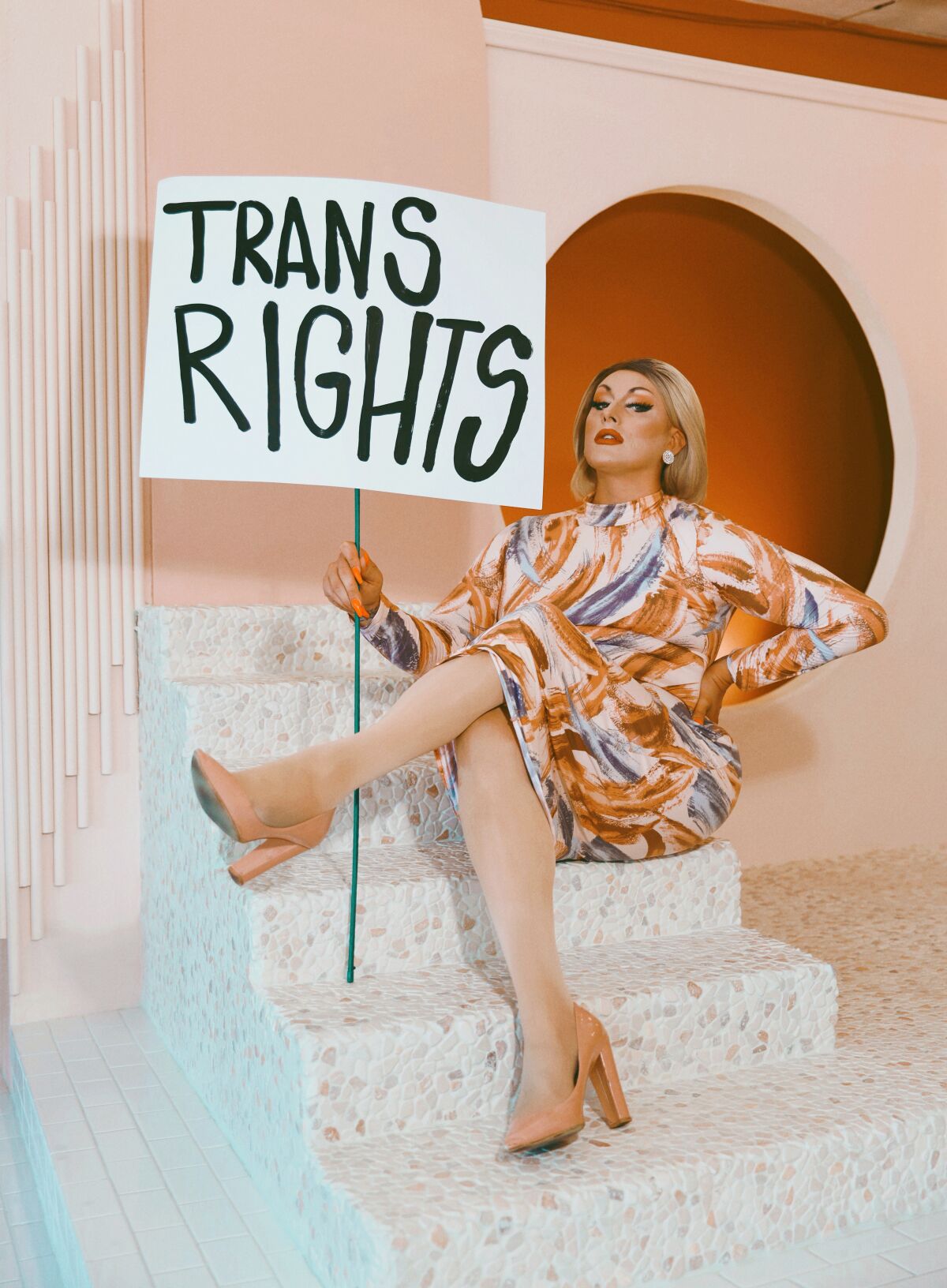
Maebe A. Girl
(Emily Eizen)
Local drag performer and member of the Silver Lake Neighborhood Council Maebe A. Girl warns that these bills may be a signal for national policy to come.
“These are very thinly veiled attacks, this very clear dog whistle is a clear call for genocide of trans people,” she says. “The bills that have been advancing through state legislatures across the U.S., and even bills introduced to the federal level, increasingly seek to limit the liberties of LGBTQIA people. It has nothing to do with children. They want LGBTQIA people out of sight, out of mind.”
California may not have any current anti-LGBTQ bills, but L.A. is not immune to the wave of anti-trans and anti-queer backlash nationwide. . In the last few weeks, the LGBTQ Center Long Beach and Folklore Salon had windows broken over their pride flags, Huntington Beach banned flying the pride flag at City Hall and trans musician Josie Wreck was violently attacked at a nightclub. Additionally, local drag queens and entertainment professionals have announced these laws impact their businesses. World of Wonder, the L.A. production company behind “RuPaul’s Drag Race,” launched a Drag Defense Fund to support queens on the ground targeted for their art.
Performers and queer people in Tennessee, as well as touring entertainers, are anxious about how anti-drag bills will be enforced and their implications on the arts, queer life and 1st Amendment rights. L.A.-based trans musicians, comedians, and performance artists, along with drag artists of many genders, have to consider the risks of traveling to states with drag bans, and many are reconsidering plans for performing in the state of Tennessee in the wake of SB003.
The definition “adult content” presented in Tennessee’s SB003 is vague and up for interpretation. Tennessee lawmaker Chris Todd said in early hearings that he believed that a “fully clothed” drag performer who was viewed accidentally through the window of a party bus by a minor should be arrested.
After public outcry over the drag ban, Tennessee amended SB003, adding that the performance of an “actual or simulated sexual activity, removal of articles of clothes or appearing unclothed” must have occurred for the performer to be charged. The definition of “male and female impersonators” listed beside strippers and exotic dancers is vague and inherently categorizes drag queens, transgender people and expansive expressions of gender in public as sexually explicit. There has been no mention of enforcement of SB003 against mainstream heterosexual pop stars who may incorporate sexually suggestive choreography in public.
“Drag is an intersection of an art practice and an identity,” DeLa says, noting that it’s in drag when she feels her truest self as a person whose gender is complex and very nonbinary. Maebe A. Girl, who is currently running for Congress, says that “when a bill attacks drag performers it also affects trans people, because it’s based on your assigned gender at birth.” She notes that these types of bills will impact not just entertainment, but could possibly be applied to queer and trans people running for public office.
Hostile anti-queer and anti-trans rhetoric has become an active part of culture war policy making. Last week, a wave of new bills were introduced, including a Florida bill that threatens to take trans children away from parents who support their transition and a Tennessee bill that guts marriage equality despite federal protections. The ACLU is currently tracking 399 anti-LGBTQ bills introduced to U.S. courts.
Many trans people’s worst fears became evident after footage of last weekend’s CPAC — the Conservative Political Action Coalition — hit the internet. The conference, which advertises itself as the largest and most influential gathering of conservatives in the world, included appearances by former Trump advisor Sebastian Gorka, who said that democrats who support trans rights are “mutilating boys and girls,” and Daily Wire host Michael Knowles who argued that being trans is “false” and that “for the good of society and especially for the good people who have fallen prey to this confusion, transgenderism must be eradicated from public life entirely at every level.”
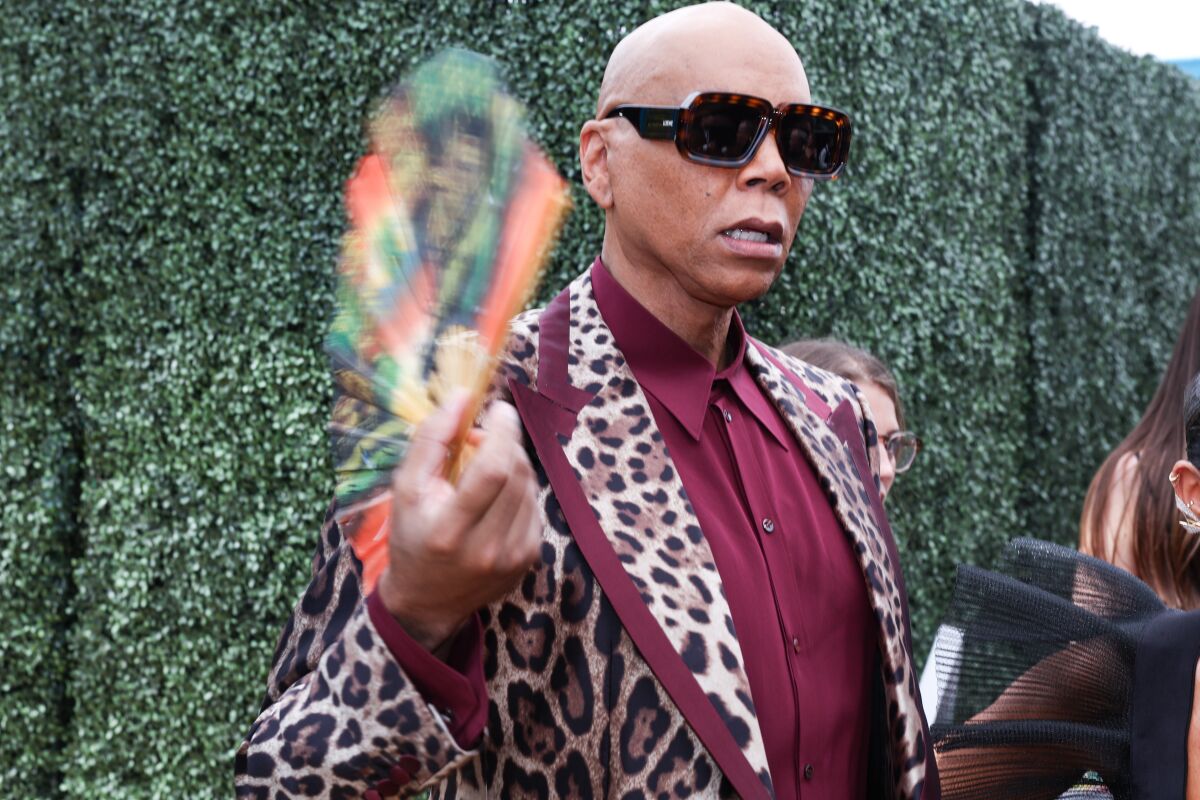
RuPaul arrives for the 74th Emmy Awards at the Microsoft Theater on Sept. 12, 2022.
(Robert Gauthier / Los Angeles Times)
Drag and live queer performing arts have been a lifeline for World of Wonder’s founder Randy Barbato, completely changing his life. Before founding the L.A.-based drag production company and going on to produce iconic queer film and TV like “Party Monster” and “RuPaul’s Drag Race,” Barbato says, he would ditch “pretentious editing classes” at NYU to attend happy hour drag shows at the Pyramid in the East Village of Manhattan in the 1980s.
It was here that the roots of World of Wonder were sewn as, along with business partner Fenton Bailey, Barbato fell in love with drag influenced by iconic drag queens like Lady Bunny, Lip Synca, Taboo and Ethyl Eichelberger. “They opened us up to a new world,” Barbato said. It was at this time that Barbato and Bailey became close to RuPaul. “We used to joke like, ‘Oh my God, could you imagine if Ru became a star and if we can help in some way? The world would be a different place.’”
In many ways, “RuPaul’s Drag Race” has made the world a different place. It shifted cultural understandings of drag, making it more accessible and providing much-needed queer and trans representation to individuals who lack that in their immediate communities and families. Event spinoffs like RuPaul’s Drag Con host events in Los Angeles, New York and London.
“Whether you’re straight or gay, it’s our humanity that we’re fighting for right now,” Barbato says, “that’s what ‘Drag Race’ is all about. It’s about hair, heels, attitude and having a great time. I watch it with my kids every Friday night because it’s educating them about how to treat other people, about what we all have in common, and about the freedom to express themselves. Its the flip side of what this right-wing messaging is all about.”
In response to the anti-drag legislation, World of Wonder created the first-ever Drag Defense Fund, a 501(c)(3) to support the ACLU’s work to defend and ensure LGBTQ rights with significant donations from MTV and “RuPaul’s Drag Race.”
RuPaul lent her voice to the announcement of the Drag Defense Fund, adding that “bullies are incompetent at solving real issues. They look for easy targets so they can give the impression of being effective, they think our love, light, laughter and our joy are signs of weakness, but they’re wrong because that is our strength.”
Barbato’s intention is to help queens and other trans and gender-expansive performers on the ground in states that ban or criminalize their art. ”The louder we can be, the more present we can be — we just have to believe that we can win this.”
This isn’t just an issue for Tennessee and states with active anti-LGBTQ bills. The rise in anti-queer and trans rhetoric and legislation has implications here in Los Angeles.
Incidents of vandalism and attacks on queer businesses like Folklore have been on the rise nationally. Additionally, the salon has recently started receiving hateful phone calls.
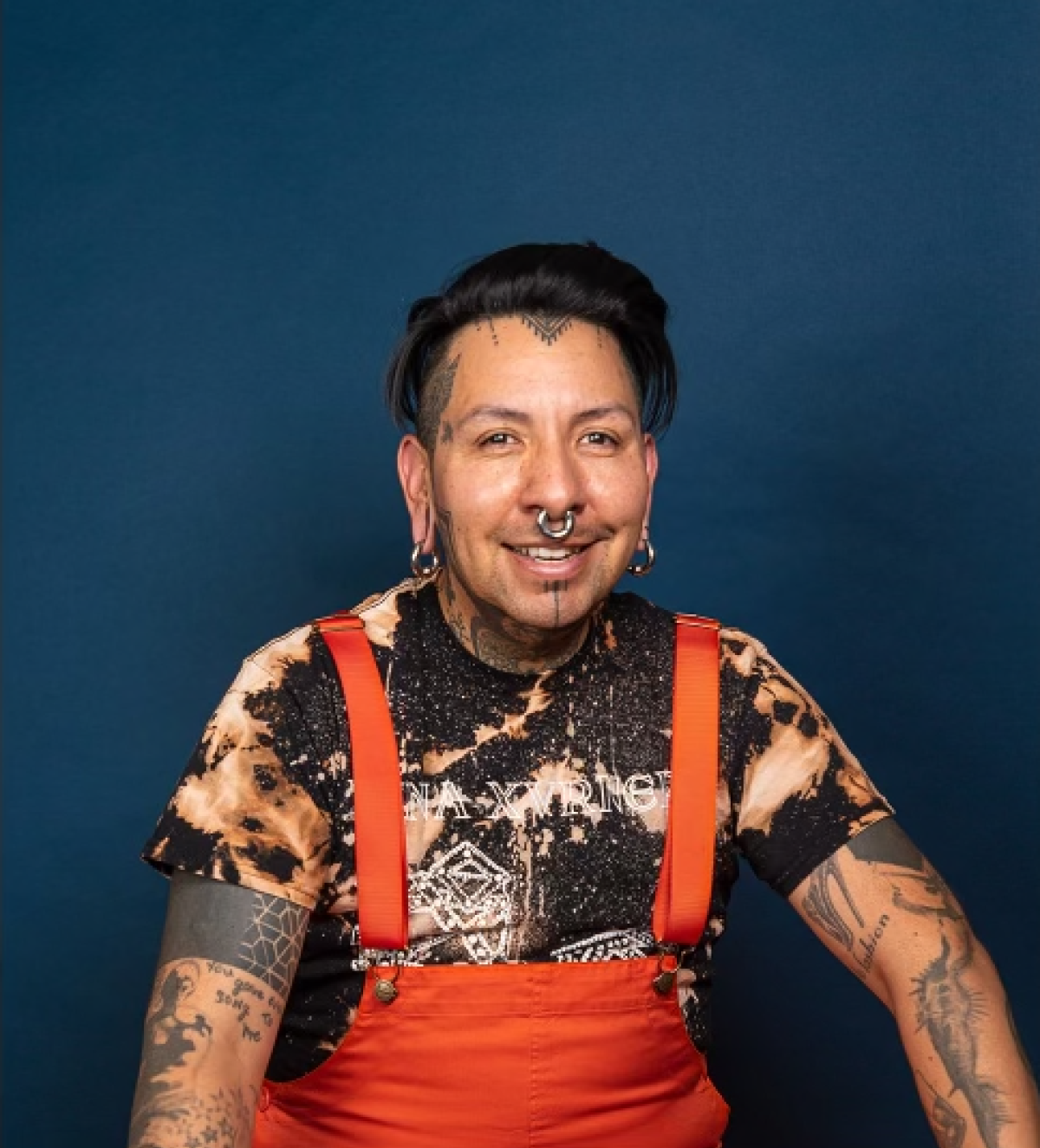
“Folklore is a salon and barber shop that is also a symbol of the LGBT community,” said salon owner Pony Lee.
In addition to running two salons, Lee runs Cruise L.A., a leather community space for queer people who don’t fit into the cisgender gay male-dominated leather scene in L.A.
“The foundation of punk rock — [is] that fundamental [feeling of] wanting change — Cruise LA is definitely a symbol of that, just like Folklore,” Lee said.
Despite the vandalism, Lee isn’t backing down. Haircuts are booked out months in advance for most of Folklore’s stylists. A new window is being installed in the historic building, and a new installment of Cruise L.A. is underway. “To be targeted feels like we’ve gone a century backwards. After so many decades of living and constantly fighting, it sucks that we’re here again.”
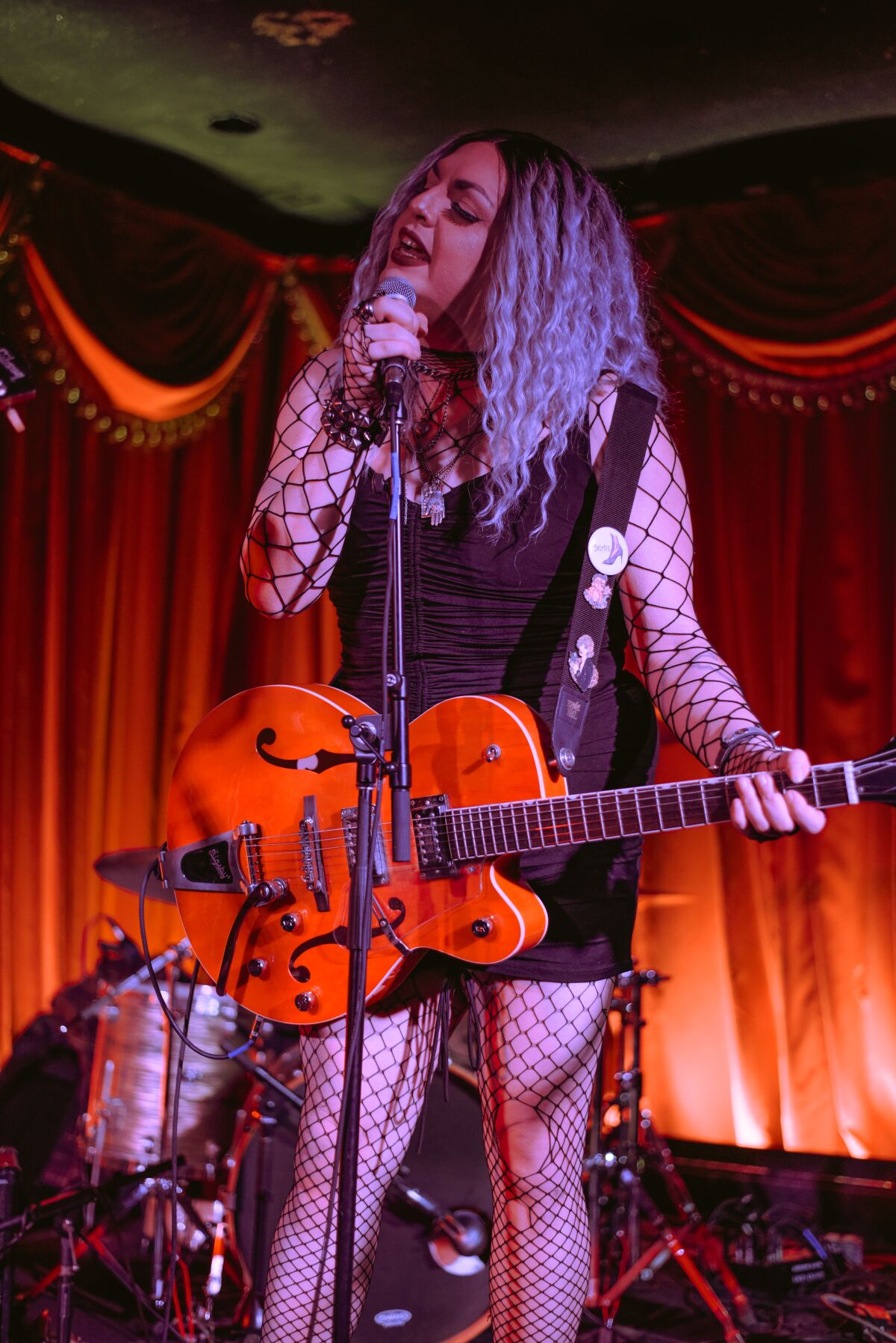
Josie Wreck, a transgender first-generation Chicana chantruse, was targeted in a violent anti-trans attack at an after-hours goth club in Los Angeles in February by a man who harassed her nearly 10 years ago for being a vocal trans feminist in the music scene. She sees the attack as connected to the recent rise in anti-trans hate.
“Violence for being who I am, before I even knew why I was targeted, is something I’ve known my whole life,” Wreck said. “I’ve always actively resisted living in fear, no matter how scary things are. Being in the closet was not a viable option for me.”
Booking her own shows and events in Orange County and L.A., Wreck has contributed to the trans and feminist-centric yearly event Grrl Fair, the Rock n’ Roll Camp for Girls Orange County and currently runs her queer-centric production company Aural Displeasure.
“Performing music saves my life,” Wreck said. “Connecting with others who make music has saved my life. I always tell people what a huge rich network of radical queer and trans and drag and Femme and allies I am a part of. Because we need it to survive. We have no choice but to express ourselves and to hold space for each other and for ourselves. There’s no option but to continue being who we are.”
Wreck was set to tour this summer with plans to visit and perform with a close friend in Chattanooga, Tenn., as well as some dates on the East Coast. However, because of legislation surrounding performance as well as bills that criminalize bathroom use by trans people, she is changing her plans. “I don’t feel that Tennessee is in the future right now,” she said.
While legislation hasn’t legally affected average queer Angelenos yet, Maebe A. Girl warns that everyone should be paying attention. “The impact of [these bills] is going to gradually add up. We’re going to see a mass migration of LGBTQIA people to blue states,” she said. “Or we may see federal legislation trying to ban and limit drag and performance, and ban gender-affirming healthcare. This is the onset of fascism.” Currently South Carolina, Kansas and Oklahoma have all filed bills to limit trans healthcare for adults.
“Speaking as a trans person, this is terrifying,” Gus Lanza says. Lanza is DeLa’s husband and business manager who handles behind-the-scenes aspects of her drag career at home and on tour. “Understanding the makeup of our Supreme Court, one can only assume that lawmakers are trying to put forth restrictive and extreme bills knowing they will be challenged and work their way through sympathetic conservative lower courts and eventually land at the Supreme Court. [In the wake of Roe vs. Wade,] we all know how that’s gonna go.”
Attacks on drag and queer performance are often framed at their core as concerns about children, concerns that most drag performers argue are unfounded.
“On one end, we have naked performers twerking, on the other end, we have children in libraries hearing storybooks, but there’s this whole spectrum in between that we’re not talking about,” DeLa says, bringing up her “Jinkx and DeLa Holiday Show” that incorporates some adult conversations with important messages about chosen family and mental health that DeLa wishes she could have heard as a kid.
“Ultimately, I would really like kids to get these messages. At the same time, I am no more interested in parenting your children than I am interested in having the government parent your children. If you don’t want them to come, fine. Children are not notoriously good audience members.”
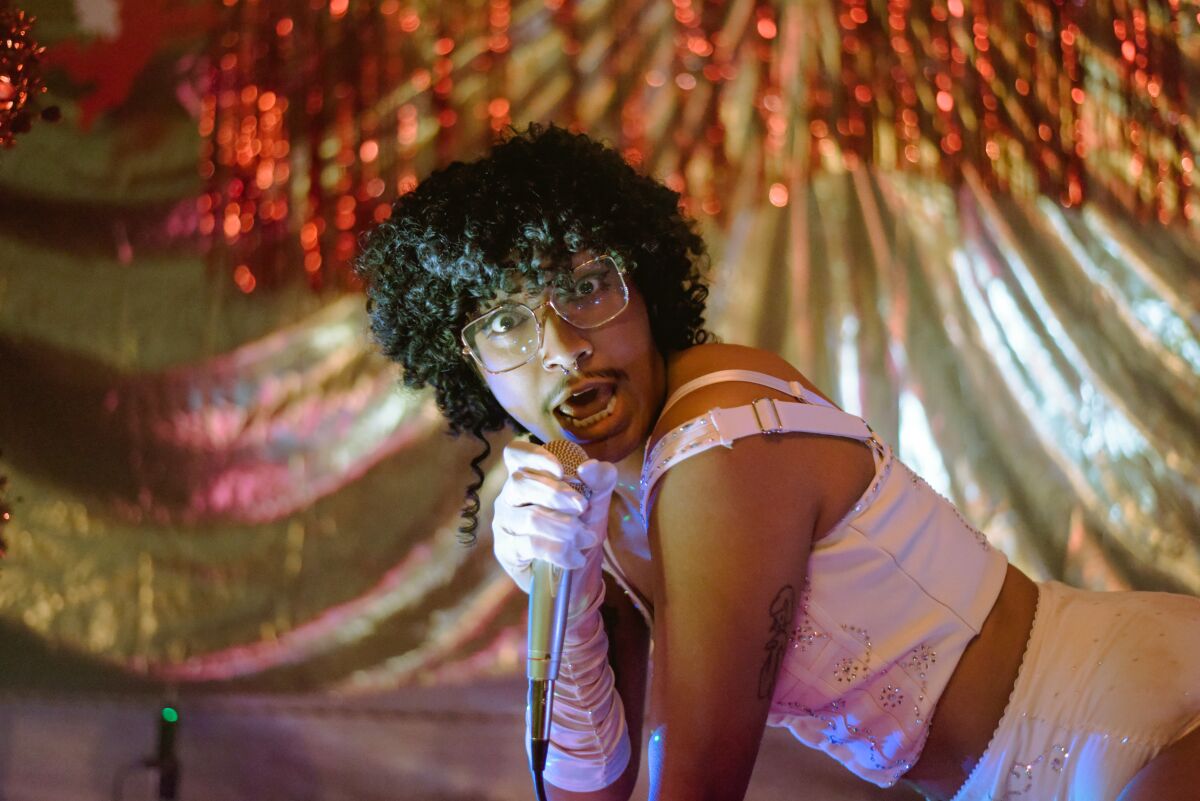
Bytch Nastee
(Liz Cabrera)
Q Gill-Dyangko, who goes by the drag name Bytch Nastee, is a local transgender drag king who is on the sexier end of the drag spectrum, blending live singing, classic drag and burlesque. While he is against bills that limit the arts through legislation, he agrees that there should be considerations for burlesque-oriented drag performers in the presence of children, something he already does without government intervention.
“There are some general guidelines that could keep everybody in a safe space,” he says, noting that announcements at all-ages events can instruct families with children to avoid the stage. “Not every drag artist gets naked and shakes their a— everywhere. We want to give people a good show, and we are trying to be aware of what we’re presenting in front of children.”
While there is a lot to fear in the wake of this legislation, DeLa says queer arts have always been a lifeline and will continue to be, even if pushed back into the underground.
“Queer people are fighters,” DeLa says. “Laws didn’t stop us then and they won’t stop us now. I am not going to go away. We will not be squashed.”
For all the latest Entertainment News Click Here
For the latest news and updates, follow us on Google News.
